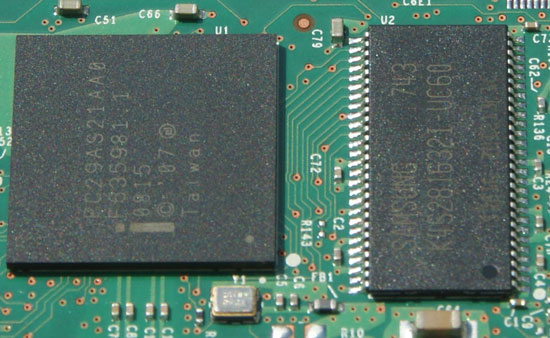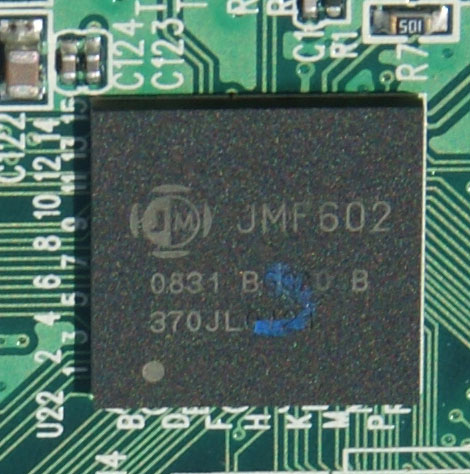Intel X25-M SSD: Intel Delivers One of the World's Fastest Drives
by Anand Lal Shimpi on September 8, 2008 4:00 PM EST- Posted in
- Storage
A Lack of DRAM or a Lack of Cache?
The high latency random write issue is annoying enough that it'd force me not to recommend any of the non-Intel MLC drives on the market today, regardless of how attractive their pricing may be. High performance with caveats isn't exactly high performance to me.

Intel's controller (left) + DRAM (right)
That being said, the root of the problem is still unknown. My first thought was that it was because the MLC drives had no DRAM buffer, and if you'll notice, Intel's MLC drive does have a DRAM buffer. I asked Intel about this and it turns out that the DRAM on the Intel drive isn't used for user data because of the risk of data loss, instead it is used as memory by the Intel SATA/flash controller for deciding exactly where to write data (I'm assuming for the wear leveling/reliability algorithms). Despite the presence of the external DRAM, both the Intel controller and the JMicron rely on internal buffers to cache accesses to the SSD.

Finding good data on the JMicron JMF602 controller is nearly impossible, but from what I've heard it's got 16KB of on-chip memory for read/write requests. By comparison, Intel's controller has a 256KB SRAM on-die. And I'm going to go out on a limb and assume that given Intel's experience with CPU caches, that its SRAM implementation is probably very well done.
With the JMicron based solutions, if you try and write too much to the drive (and trust me, it won’t take a lot) and the buffers get full, the controller tells the system that it’s not ready to write more data and you get a pause.
When you cause the JM602’s internal buffer to overflow, your system runs in bullet-time. Applications take much longer to launch and close, windows take longer to appear, and there are distinct pauses in anything you want to do that involves the disk. Want to send an IM? Well, that writes to an IM log - you can expect a pause before you can send your IM. Loading webpages is the worst, reading from and writing to the cache wreaks havoc on these cacheless MLC drives. Just for kicks I tried loading AnandTech while I was extracting a 5GB file on the SuperTalent 60GB MLC, it took over 10 seconds for the website to load. Once the JM602 was free to fulfill the read request, the website just popped up - but until then it was like my DNS was failing. It’s a lot like what happens to your notebook if you try and do too much, the disk quickly becomes a bottleneck.
Thankfully, as we've already seen, this problem is only limited to JMF602 based MLC drives. The SLC drives and the Intel MLC are totally fine, so while I'll include these problematic MLC drives in today's comparison, let me state now that I would not purchase one.
JMicron's roadmap shows a new controller next year with an integrated ARM core as well as support for external DRAM, which could alleviate these problems, but until now the controller, and drives based on it, aren't worth it. You get a much better overall experience out of a conventional mechanical disk drive, and much better performance from the Intel SSD or any of the SLC solutions on the market.
The Test
| CPU: | Intel Core 2 Quad Q9450 (2.66GHz) |
| Motherboard: | Intel DG45ID |
| Chipset: | Intel G45 |
| Chipset Drivers: | Intel 8.1.1.1010 (Intel) |
| Memory: | Corsair XMS2-8500 1066 |
| Video Card: | VisionTek Radeon HD 4850 |
| OS: | Windows Vista Ultimate 32-bit |










96 Comments
View All Comments
aeternitas - Thursday, September 11, 2008 - link
Converting all your DVDs to divx is a silly idea. Why would you want to lose dynamic range and overall quality (no matter the settings) for a smaller movie size when 1TB costs 130$?SSD = Preformance (when done right)
HHD = Storage.
johncl - Tuesday, September 9, 2008 - link
Noise isnt a big problem on a 3.5" in a media pc as the other poster states. But heat can be a problem, especially if you plan on passively cool everything else in the computer. An SSD will solve both problems, but only if the SSD is the only disk in the system. From what I understand you want to have both in yours which makes sense since movies/music occupy a lot of space. In that case you will not experience any improved performance since the media would have to be read off the mechanical drive anyway.Your best bet would be to build yourself a small media server and put all noisy hot mechanical disks in that and use small SSDs on your media pc (and indeed any other pc). That way you get the best of both worlds, fast response on application startup/OS boot, silent and no heat - as well as a library of media. You would probably have to use a media frontend that caches information about all media on your server though so it doesnt have to wait on server harddisk spinup etc for every time you browse your media. Perhaps Vista Media Center already does this?
mindless1 - Thursday, September 11, 2008 - link
An SSD will not "solve" a heat problem. The hard drive adds only a small % of heat to a system and being lower heat density it has one of the less difficult requirements for cooling.Speed of the HTPC shouldn't be an issue, unlike a highly mixed use desktop scenario all one needs is to use stable apps without memory leaks then they can hibernate to get rid of the most significant boot-time waiting. Running the HTPC itself the OS performance difference would be trivial and the bitrate for the videos is easily exceeding by either storage type or an uncongested LAN.
piroroadkill - Tuesday, September 9, 2008 - link
To be honest most decent HDDs don't make significant noise anyway, even further quelled by grommets or suspending the drive.Also, the reads will occur on the drive you're reading the movie from - so if you plan to use an external HDD as the source, this will make no difference whatsoever.
dickeywang - Tuesday, September 9, 2008 - link
Imaging you have a 80GB SSD, with 75GB been already occupied by some existing data (OS, installed software, etc), so you only have 10GB space left, now lets say you write and then erase 100GB/day on this SSD, shouldn't the 100GB/day data all be written on the 5GB space? So each cell would be written 100GB/5GB=20cycle/day, so you will reach the 10000cycle/cell limit within less than 18months.Can someone tell me if the analysis above is correct? I guess when they say "100GB/day for 5 years", they should really take into account how much storage space that is un-occupied on the SSD, right?
johncl - Tuesday, September 9, 2008 - link
A good wear leveling algorithm can move about "static" blocks so that their cells are also available for wear. I do not know if the current implementations use this though. Anyone know this?Lux88 - Tuesday, September 9, 2008 - link
I remember reading a number of SSD reviews, but it's first time I read about the pauses. Indeed, quick search revealed 5 articles, starting from May 2007, but the conclusions only mentioned a high price and a small capacity as drawbacks. Nothing about freezing nor pauses. Some of these 5 probably were SCL-drives, some MLC.It's funny how a simple multitasking test can reveal an Achille's heel of large group of products, just when a product appears that doesn't suffer from this particular drawback.
Overall good article and good info. So good that all the previous articles on the matter of SSDs on this site seem bad in comparison. Thanks for the info anyway, better late than never ;).
eva2000 - Tuesday, September 9, 2008 - link
If the OCZ Core controller does indeed have 16KB on chip cache for read/writes maybe that's the problem as OCZ Core pdf states for their SSD"each page contains 4 Kbytes of data, however, because of the parallelism at the back end of the controller, every access includes simultaneous opening of 16 pages for a total accessible data contingent of 64 Kbytes"
????
araczynski - Tuesday, September 9, 2008 - link
looks quite promising. maybe within about 2 years they'll get the bugs worked out, a more realistic price, and an extended life span, and i'll replace my regular drives.yyrkoon - Tuesday, September 9, 2008 - link
"No one really paid much attention to Intel getting into the SSD (Solid State Disk) business. We all heard the announcements, we heard the claims of amazing performance, but I didn't really believe it. After all, it was just a matter of hooking up a bunch of flash chips to a controller and putting them in a drive enclosure, right? "You mean you did not pay attention? I know I did, because Intel has always been serious with things of this nature. That and they are partnered with Crucial(Micron) right ?. . . Now if this was some attempt at sarcasm, or a joke . . .
Seriously, and I mean VERY seriously, I was excited when Anandtech 'reported' that Intel/Micron were going to get into the SSD market. After all affordable SSDs are very desirable, never mind affordable/very good performing SSDs. That, and I knew if Intel got into the market, that we would not have these half-fast implementations that we're seeing now from these so called 'SSD manufactures'. Well, even Intel is not impervious to screw ups, but they usually learn by their mistakes quickly, and correct them. Micron (most notably Crucial) from my experience does not like to be anything but the best in what they do, so to me this seemed like a perfect team, in a perfect market. Does this mean I think Micron is the best ? Not necessarily. Lets me just say that after years of dealing with Crucial, I have a very high opinion of Crucial/Micron.
"What can we conclude here? SSDs can be good for gaming, but they aren't guaranteed to offer more performance than a good HDD; and Intel's X25-M continues to dominate the charts."
Are we reading the same charts ? These words coming from the mouth of someone who sometimes mentions even the most minuscule performance difference as being a 'clear winner' ? Regardless, I think it *is* clear to anyone willing to pay attention to the charts that the Intel SSD "dominates". Now whether the cost of admission is worth this performance gain is another story altogether. I was slightly surprised to see a performance gain in FPS just by changing HDDS, and to be honest I will remain skeptical. I suppose that some data that *could* effect FPS performance could be pulled down while the main game loop is running.
Either way, this is a good article, and there was more than enough information here for me(a technology junky). Now lets hope that Intel lowers the cost of these drives to a more reasonable price(sooner rather than later). The current price arrangement kind of reminds me of CD burner prices years ago.